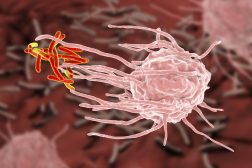Definition
noun
(microbiology) A repetitive glycan polymer attached to the core oligosaccharide of the LPS layer of certain bacteria; a somatic antigen that comprises the outermost domain of the lipopolysaccharide
(immunology) A major blood group antigen indicating the presence of H antigen and the lack of additional antigens, particularly N-Acetylgalactosamine (found in A antigen) and galactose (in B antigen)
Supplement
In microbiology, O antigen renders additional protection from the antimicrobial action of certain antibiotics. Without it, the LPS becomes hydrophobic and therefore is more susceptible to the action of hydrophobic antibiotics. 1
In immunology, blood types are determined by the presence of blood-group antigens. In humas, there are three types of blood-group antigens, namely H antigen, A antigen, and B antigen. They differ basically on structural component.
Synonym(s):
- (microbiology) O polysaccharide
- (microbiology) O side-chain
Compare:
See also:
- (immunology) H antigen
- (immunology) ABO blood group
- (immunology) Blood Groups
Reference(s):



